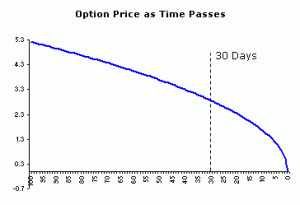The ratio of the change in an option price to the decrease in time to expiration. Since options are a wasting asset, their value declines over time. As an option approaches its expiry date without being in the money, its time value declines since the probability of that option being profitable (in the money) is reduced. Also known as “theta” and “time-value decay”.
Time decay is a crucial component traders consider when deciding when/where to buy sell options
Time decay of an option begins to accelerate in the last 60 to 30 days before expiry, providing the option is not in the money (out of the money). But in the case of options that are deep in the money, time value decays more rapidly. The market finds these options too expensive compared to other strike prices or futures. As such, the holders of deep-in-the-money options nearing expiry discount the time value to attract buyers and in turn realize the intrinsic value.
The greater the certainty about an option’s expiry value, the lower the time value. Conversely, the greater the uncertainty about an option’s expiry value, the greater the time value.
